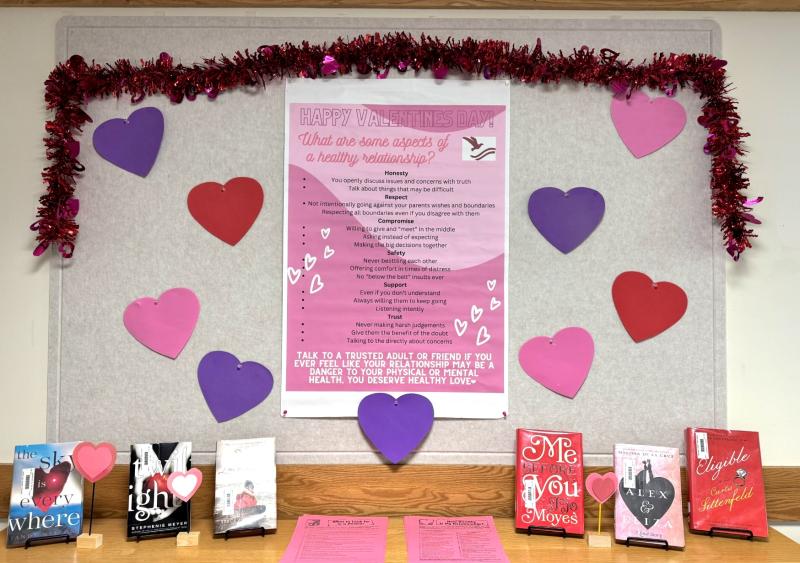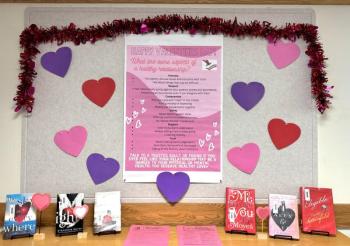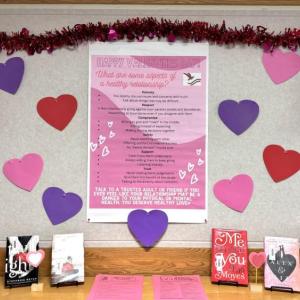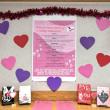Raising awareness about teen dating violence
With Valentine’s Day tucked in the middle of the otherwise dreary month, February is considered a time of romance. However, it's also an opportunity to think critically about relationships as the whole month is dedicated to raising awareness about teen dating violence.
It’s a busy period for Allison Fortin, youth educator/advocate at New Hope Midcoast, as she presents to schools across Lincoln and Sagadahoc counties, sharing with students what a safe and respective relationship entails, and how power and control can manifest. She also emphasizes that relationships exist on a spectrum. Sometimes dynamics may not be the right personal fit, or both parties aren't showing up at their best.
“Nobody is perfect, and the biggest thing is being able to take accountability for making a mistake or behaving in a way that was not OK,” said Fortin.
It’s when there is no accountability, awareness, or behavior changes that relationships turn toxic. The CDC reports about one in 12 teens experience physical dating violence, and sexual dating violence occurs to about one in 10.
Some populations are more at risk than others with LGBTQ teens experiencing partner violence more frequently than their heterosexual counterparts, according to the CDC. This information is no longer hosted directly on the CDC website in compliance with President Trump’s executive order. The Human Rights Campaign Foundation explained, marginalized groups are more likely to experience intimate partner violence as abusers will exploit societal stigmas or economic vulnerabilities to maintain control.
“Support networks can be really vital for people when they're trying to get out of an abusive relationship, and for teens who unfortunately don't have that support network, it can just make things way more challenging for them,” said Fortin.
Another part of Fortin’s curriculum is “mindful consumerism:” analyzing media aimed at teens and young adults and recognizing when unhealthy dynamics are being romanticized. It doesn’t mean students can’t enjoy said media (for example: the widely popular “Twilight” series), but they should be aware of what messages it’s sending.
As healthy relationship and consent v. coercion models become emphasized in teen education, there have been moves toward incorporating these discussions into sexual education programs. The idea is, teaching students to care for and respect one another will reduce the chance they’ll commit, or be subject to, sexual violence.
“It’s good to be open,” said Aminda LaBrecque, practice coordinator for Boothbay Region High School’s (BRHS) Student Health Center, and advisor for the Student Health Advisory Board (SHAB). SHAB is a youth-adult group that promotes health and safety for students.
LaBrecque said SHAB members have expressed a desire for increased sexual education. Both Boothbay region elementary and high schools have received complaints about the quality of their sex ed curriculum, she said.
Last year, then-sophomore Sarah Harris polled fellow students on the quality of sex ed at BRHS as part of her Champions for Change project. Her report was published in the Boothbay Register in July.
Over half of students surveyed did not feel they had been adequately educated on most topics under the “comprehensive sexuality education” umbrella which, as defined by the Sexuality Information and Education Council of the United States, includes accurate information about human development, anatomy, reproductive health, contraception, childbirth, sexually transmitted infections (STIs), abstinence, reproductive choice and LGBTQ issues.
In the article, BRHS health teacher Dennis Dacus explained that some issues have gone uncovered (including a unit on dating, consent and healthy relationships) due to the class’s time constraints and the need to address other important health topics. Dacus did express intent to incorporate more sex ed for the 2024-2025 school year. He could not be reached for further comment.
LaBrecque hopes to supplement education by displaying posters around Valentine’s Day and prom season. She is also working on bringing in Speak About It, a theater and dialogue-based consent education and sexual assault prevention nonprofit, to perform a skit for the school. This partnership is still in development.
“With youth, we also want them to feel empowered, the same that we want adults to feel empowered in their (ability) to make choices and not be told what to do,” said Fortin.
New Hope Midcoast 24/7 Hotline: 1-800-522-3304
























